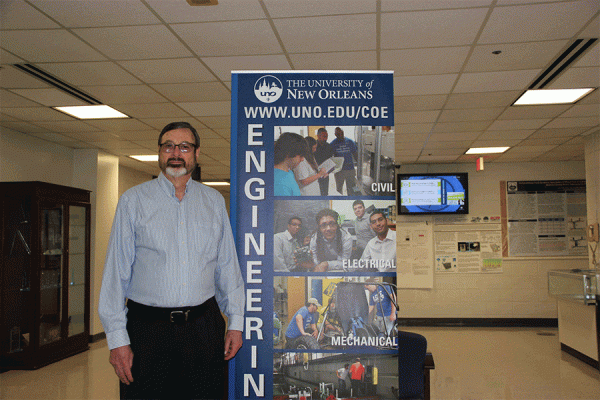The decision to attend the University of New Orleans was easy for alumnus Henry Singer. His family did not have money and the University’s $35-per semester tuition was affordable, said Singer, the fourth of seven children born into what he calls a “working class poor family” in New Orleans.
His dad, a clerical worker who often worked three jobs, had an eighth-grade education. His mom was a high school graduate, Singer said.
“We had 10 of us in a two-bedroom, one-bath rental house,” Singer said. “One thing that I learned from them was the value of hard work. I think a lot of UNO students are like that, they come from meager means but they do have parents or a parent who does work very hard.”
Two days after graduating high school in 1964, Singer started work at the Blue Plate Foods factory earning $1.25 an hour making mayonnaise, salad dressing and other condiments. Despite the minimal wages, Singer said he was able to earn enough to pay tuition at UNO and buy books.
“I started at UNO in ‘64, so in two weeks I had a year’s worth of college tuition paid for at a minimum wage job,” he said. “Now, it took three more weeks to pay for the books because the books were actually more expensive than the tuition!”
When he started school that fall, he worked on campus. Singer said he “had it easy” compared to today’s working college student.
“I didn’t have to work that long to be able to afford a lot,” Singer said. “I could do it without having to get student loans or without having a scholarship. Nowadays very few working class kids can do it without one or both of those.”
That insight and empathy has led Singer to donate money to establish The Henry J. Singer Endowed Scholarship at UNO for the College of Engineering and the College of Sciences.
“I’d like to help others reach their potential. Making a donation is really making an investment into the future of the student. It is even an investment into the future of the University, the city, the state or even the country,” Singer said. “You never know which students are going to go on and do something really incredible.”
Singer enrolled at UNO as the lakefront campus was slowly evolving from its naval base origins.
“When I arrived on campus, you had the Liberal Arts Building, the Sciences Building and they had just opened the library like a month before I arrived on campus,” Singer said. “Everything else was the old barracks and military buildings from the old naval base that was there.”
Singer, who earned an engineering degree in 1969, recalled attending class in a wooden building near the smokestack that housed the College of Sciences. Years later, the Department of Engineering would become the School of Engineering and eventually the fully accredited College of Engineering.
“One of my biggest memories is that the theme of the University seemed to be growth. Chancellor Homer Hitt had a master plan for the campus and that was communicated to the students,” Singer said. “It seemed like every year a new building was added.”
Singer recalled the University also was attempting to create its own identity. He was a part of the student body that voted to choose the University’s colors and its mascot.
“At the time I characterized it as growth, but you know what I characterize it as now?” Singer asks. “Like a butterfly going from the chrysalis to the wings and flying. That takes like a week or two for that to happen so you make that years … that’s about what it took for LSUNO to go from those first classes to a butterfly that was now flying.”
After earning an engineering degree, Singer worked six years with the U. S. Army Corps of Engineers as part of its safety division that created policy and work procedures.
“At the time, engineers were in great demand and I had three or four job offers, and it was a matter of deciding which one I wanted to take,” Singer said.
He left the Corps to work in Washington, D.C. where he spent the better part of four decades as a safety administrator for the Public Buildings Service of the General Service Administration, the agency that oversees federal buildings.
Singer retired in 2012 and moved back to New Orleans in 2016.
“I loved working for government and working with other agencies too. I got to do some really neat stuff,” Singer said. “When you’re in the safety business, you’re doing things that protect human life and health and that resonates with me.”
His time at UNO also resonates, Singer said. It was there that his “19th century” prejudices on racial and gender equality were challenged and the fallacies of his views exposed, said Singer, who is White.
“UNO was integrated, which was pretty remarkable for the day because public colleges in the South were not,” Singer said. “You never know how you’re going to be enlightened.”
Singer recalled his epiphany came while sitting in the back of a philosophy class listening to a fellow student discuss topics with their professor.
“She would really engage him in really interesting discussions,” Singer said. “I’m in the back of the class and I realized, ‘You know, she is smarter than I could hope to be, and she’s Black. How can I be superior to her?’”
That was my awakening, Singer said.
“I’m not superior to her. I’m not superior to anybody,” Singer recalled thinking. “UNO prepared me, and other students, for success in a different world than what we were brought up in.”





